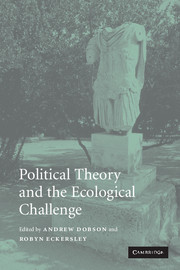4 - Feminism
Published online by Cambridge University Press: 06 July 2010
Summary
Hybridity shifts the focus
Feminist thought and environmental thought, feminist and ecological movements, have both emerged in recent times to challenge dominant worldviews and to acknowledge major aspects of the world that have been ignored, excluded or denied. They have much in common, and I write as a feminist who is also an environmental activist. But feminism and environmentalism have also challenged one another and come into conflict. The main forum for fruitful dialogue between them has been the hybrid area of ecofeminism, which aims at developing ‘a feminism that is ecological and an ecology that is feminist’.
Feminist and ecofeminist thinkers have applied feminist analyses to problems in environmental philosophy and theory. These have added significantly to the choices about how to theorise environmental issues. Some theorists from the environmental side express special suspicion and distrust of the ‘hybrid’ loyalties they discern here, contrasting these with the supposedly purer and ‘ungendered’ loyalties of predominantly male and white environmental theorists who have dominated the field. Treating women's experience and theories as gendered, and dominant theories based on male experience as pure and ungendered, is the equivalent of seeing black as coloured or racially based but dominant theories based on white experience as neutral and pure, lacking in colour or racial bias.
Many ‘pure’ positions in environmental theory involve hybrid loyalties, which are the worse for being unexamined and unannounced – for example, unrevealed political loyalties, eurocentric and androcentric loyalties.
- Type
- Chapter
- Information
- Political Theory and the Ecological Challenge , pp. 51 - 74Publisher: Cambridge University PressPrint publication year: 2006
References
- 9
- Cited by



